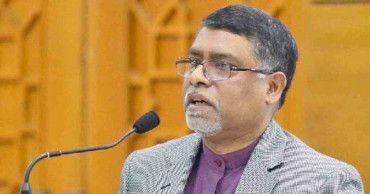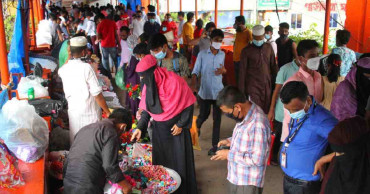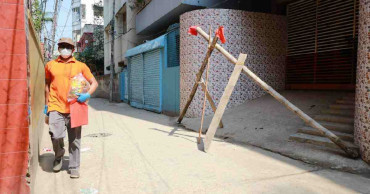coronavirus patients
Looking for hotels for Covid patients as hospitals struggle: Minister
The government is going to rent hotels for providing treatment to Covid patients with mild complications as hospitals are under an unprecedented crisis with huge patients, Health Minister Zahid Maleque said on Tuesday.
“Already 90 percent of the seats in hospitals have been packed. And 95% ICU beds are also occupied. We’re preparing a field hospital at Bangabandhu Medical University where we can immediately arrange 500-600 beds,” he said.
The minister said, “Everyone infected with corona needs not to be hospitalised. So, we’re thinking of renting hotels for dealing with the patients who’ve mild complications. We’ll have doctors, nurses, medicines, and some oxygen in those hotels.”
He came up with the remarks while talking to reporters after an inter-ministerial meeting at the Secretariat with Liberation War Affairs Minister AKM Mozammel Haque in the chair.
Read: Bangladesh’s Covid nightmare: 235 more die, 15,776 infected
Maleque said they have started looking for hotels as they will no longer be able to accommodate the growing number of patients in hospitals. “If we can give treatment to the Covid patients with mild infections at hotels, they’ll be able to go back home after recovery from there, and it will help reduce the pressure on the hospitals. So, we’ve taken this step.”
4 years ago
Chattogram seroprevalence study: 90% of patients who tested positive have antibodies after 6 months
A seroprevalence study in Chattogram has shown the presence of anti-coronavirus antibodies in 65% of Covid-19 patients in Chattogram.
The study enrolled both those who tested positive for the virus, and those who tested negative but were treated as Covid patients based on symptoms, and observed them over a 6-month period.
The antibodies were found in about 90 percent of those who tested positive for the virus in an RT-PCR test, and 26% of RT-PCR negative patients.
Physicians at Chittagong General Hospital conducted the research on 1530 people (989 who tested positive, and 541 who tested negative)from October 2020 to April 2021 to investigate the presence and persistence of antibodies produced by the body as an immune response to Covid-19.
Also read: Bangladesh detects first case of Indian Coronavirus strain
The objectives of the study apart from finding the presence of antibodies were to gather information on the socio-economic status of the patients, what symptoms were present in them at the time of infection and whether there were any long-term complications after recovering from Covid.
Although participants of the research were selected on random basis, majority of them were male (75%) and employed (60%).
Their main symptoms after contracting Covid-19 were fever (92 percent), cough (63 percent), and loss of sense of smell (52 percent). Symptoms such as sore throat, headache, diarrhoea, shortness of breath, etc. have also been observed.
Many of the affected people were already suffering from chronic diseases like diabetes (15 percent), high blood pressure (23 percent), respiratory complications (9 percent) and heart disease. After recovering from Covid, about 57 percent of them had long-term symptoms including physical weakness, pain, anxiety, fatigue, cough, hair loss, etc.
Also read: Covid-19: Bangladesh sees 45 more deaths with 1285 new cases
Dr. Md. Abdur Rob, the head of the research team, said, “We have been treating Covid patients for a long time. This study is very timely in order to know more about Covid-19 in more detail about patients' symptoms, long-term complications after recovery and the presence of antibodies."
Dr. Mohammad Asif Khan, Coordinator of the research work, said that there is no alternative to such research to improve the medical science in the reality of our country as directed by the Hon'ble Prime Minister.
"This is the first example of a district-level hospital conducting research on its own initiative. We hope that this initiative will encourage self-managed research in the medical field," he said.
In light of the data collected, Dr. HM Hamidullah Mehdi said that one of the successes of this study is that a large number of infected patients have been included in it and the data has been collected through direct interviews and tests. The results of the study will make the government's ongoing COVID-19 vaccination program more acceptable and dynamic.
Also read: Indian Covid Strain: Two more cases identified in Jessore
Dr. MA Kabir Chowdhury, who is in charge of data and data analysis, said that while analyzing the data collected in the study, they have found some important information, such as the presence of antibodies in the body of RT-PCR positive patients for more than 6 months.
The findings were presented today at the conference room of the Chattogram General Hospital.
Barrister Mahibul Hasan Chowdhury Nawfel, Deputy Minister for Education and Chairman of the Management Committee of the 250-bed Chattogram General Hospital was the chief guest on the occasion.
He said the 250-bed Anderkilla General Hospital in Chittagong was the first and only place of recourse for Covid-19 patients in Chittagong after the corona virus entered the country. Initially, the hospital was in dire need of medical equipment for the treatment of patients suffering from covid, but now it is fully capable.
4 years ago
India's virus surge damages Modi's image of competence
India’s hospitals were packed with coronavirus patients, relatives of the sick scrambled to find supplies of oxygen, and crematoriums were running near full capacity to handle the dead.
Yet despite those clear signs of an overwhelming health crisis, Prime Minister Narendra Modi pressed ahead with a densely packed campaign rally.
“I have never seen such a huge crowd before!” he roared to his supporters in West Bengal state on April 17, before key local elections. “Wherever I can see, I can only see people. I can see nothing else.”
As another deadly wave of COVID-19 infections was swamping India, Modi's government refused to cancel a giant Hindu festival. Cricket matches, attended by tens of thousands, carried on, too.
The catastrophic surge has badly dented Modi’s political image after he drew praise last year for moving quickly to lock down India’s nearly 1.4 billion people. Now, he’s been called a “super-spreader” by the vice president of the Indian Medical Association, Dr. Navjot Dahiya.
With deaths mounting and a touted vaccine rollout faltering badly, Modi has pushed much of the responsibility for fighting the virus onto poorly equipped and unprepared state governments and even onto patients themselves, critics say.
“It is a crime against humanity,” author and activist Arundhati Roy said of Modi’s handling of the virus. “Foreign governments are rushing to help. But as long as decision-making remains with Modi, who has shown himself to be incapable of working with experts or looking beyond securing narrow political gain, it will be like pouring aid into a sieve.”
The 70-year-old, whose image as a technocrat brought him deep approval from a middle class weary of corruption and bureaucratic dysfunction, has been accused of stifling dissent and choosing politics over public health.
When the official COVID-19 death toll crossed 200,000 — a number experts say is a severe undercount — Modi was silent.
His government says it is on a “war footing,” ramping up hospital capacity, supplies of oxygen and drugs.
“The present COVID pandemic is a once-in-a-century crisis,” Information and Broadcasting Minister Prakash Javadekar told The Associated Press. “All efforts are being made to overcome the situation by the central government in close coordination with the state governments and society at large.”
When Modi won national elections in 2014, he presented himself as someone who could unlock economic growth by merging business-friendly policies with a Hindu nationalist ideology.
Critics saw him as craving power over the national welfare and catering to his Hindu nationalist base. They blamed him — although courts exonerated him — in the bloody 2002 anti-Muslim riots in Gujarat state, where he was chief minister.
The economy tumbled after his government overhauled India’s cash supply and introduced a goods and services tax. Yet, he easily won reelection in 2019 on a wave of nationalism following clashes with archrival Pakistan.
Despite a second term marred by a souring economy, widening social strife, and deadly clashes with neighboring China, “Modi has proven to be incredibly politically resilient,” said Milan Vaishnav, director of the South Asia program at the Carnegie Endowment for International Peace.
When the coronavirus hit, Vaishnav said Modi took an approach different from former President Donald Trump and current Brazilian President Jair Bolsonaro.
“He never called the virus a hoax. He took it seriously. He encouraged mask-wearing, social distancing. He encouraged the sorts of things health authorities everywhere have been calling for,” he added.
The strict lockdown, imposed on four hours’ notice, stranded tens of millions of migrant workers who were left jobless and fled to villages with many dying along the way. But experts say the decision helped contain the virus and bought time for the government.
Cases rose when the country started reopening in June 2020, and the government developed emergency infrastructure plans. When the wave receded and reported cases plummeted over the winter, many officials saw it as a triumph. States dismantled makeshift hospitals and delayed adding ICU beds and ventilators.
The government had sought to create 162 oxygen plants earlier, but has only built 38. It says 105 more will be built this month.
The fragile health care system was not upgraded enough, said Gautam Menon, a science professor at Ashoka University, “and with the current surge, we’re seeing precisely the consequences of not doing this.”
When cases ebbed in January, Modi crowed about India’s success, telling the World Economic Forum that the country “has saved humanity from a big disaster by containing corona effectively.”
His ruling Bharatiya Janata Party hailed his “visionary leadership,” making India a “proud and victorious nation in the fight against COVID.”
In mid-March, tens of thousands attended cricket matches against England at Narendra Modi stadium in Gujarat, an event that swelled national pride even amid warnings that infections were climbing.
On March 21, advertisements on the front pages of newspapers read, “Beautiful Clean Safe,” as Modi and a political ally welcomed Hindu devotees to the Kumbh Mela, a pilgrimage to the Ganges River that drew millions throughout April.
By contrast, in March 2020, his government blamed a Muslim gathering of 3,000 for an initial spike in infections in a move that triggered violence and boycotts, even as courts dismissed the accusations.
Critics have blasted the BJP for holding election rallies packed with tens of thousands of unmasked supporters, particularly in West Bengal. Other parties also campaigned to large crowds. Bowing to criticism, Modi began appearing over video instead of live, but the crowds remained.
Though his party was defeated in the state, analysts say he still enjoys popularity nationwide.
Meanwhile, India’s vaccination campaign begun in January has sputtered amid perceptions the virus was defeated. Only 10% of the population has received one shot and fewer than 2% have gotten both since it began in January.
The latest effort to inoculate those between 18 and 44 has been left to states and the private sector — an approach that critics say will make it easier for the government to pass blame when problems arise. Already, several states have said they don’t have enough vaccine to even start.
The surge has sparked assistance from overseas, a reversal of India’s earlier success at “vaccine diplomacy” when it exported 64 million doses. Some say Modi’s flagship self-sufficiency campaign, known as “Make in India,” is being undermined.
“India has long sought to project itself as a strong nation that need not be dependent on any other. Its immediate need for international assistance flies in the face of that image,” said Michael Kugelman of the Asia Program at the Washington-based Wilson Center.
Some Modi supporters are lashing out. When BJP lawmaker Kesar Singh Gangwar died of the virus in Uttar Pradesh state, his son said Modi’s office didn't help.
“What kind of government is this? What kind of PM is Modi?” said Vishal Gangwar. “If he cannot provide treatment to a lawmaker of his own party, what is happening to a common man is anybody’s guess.”
To circumvent such criticism, the government ordered Twitter to remove posts criticizing his pandemic response. In BJP-run Uttar Pradesh, authorities recently charged a man over a tweet pleading for oxygen for his dying grandfather, accusing him of “circulating a rumor," as top officials deny widespread oxygen shortages.
“To blame social media or users for either critiquing or begging for help is just — I mean, what are their priorities? To help people or silence criticism?” said digital rights activist Nikhil Pahwa.
The level of urban and middle class anger at Modi is unprecedented, political analyst Vaishnav said, although it is blunted by supporters who believe he can do no wrong.
“He shouldn’t be expected to solve all problems by himself. The government machinery which existed before him, full of corruption, is to blame,” said Sunil Saini, a driver in New Delhi. “My vote will go to Modi the next time too.”
4 years ago
Fire at Baghdad hospital kills several Covid patients
A fire broke out in a Baghdad hospital that cares for coronavirus patients after oxygen cylinders reportedly exploded late Saturday, officials said. There were initial reports of 15 people dead.
Firefighters rushed to put out the flames and clear out patients at the Ibn al-Khatib hospital, which provides care for severe coronavirus patients in its intensive care unit.
“I don’t know how many victims there are, there are so many burned bodies all over the place,” said Dr. Sabah al-Kuzaie, present at the scene.
Initial reports showed at least 36 people wounded in addition to the 15 dead, according to medical and security officials. The officials spoke on condition of anonymity in line with regulations. Iraqi authorities have not released to an official casualty count.
Also read: Oxygen tank leak claims 22 lives in India Covid hospital
There were at least 120 patients in the hospital at the time of the fire, a doctor at the hospital said.
The fire is believed to have been caused when at least one oxygen cylinder exploded inside the hospital, local media reported. At least two doctors at the scene confirmed they believed the oxygen cylinder had caused the flamed that raged in the second floor of the hospital.
Also read: 5 dead in fire at India's Covid vaccine facility
Iraq is in the midst of a severe COVID-19 wave. Daily coronavirus rates now average above 8,000 new cases, the highest since the pandemic broke out in the country last year. The government is urging the public to get vaccinated, but demand has been low due to widespread mistrust of the health care system and the vaccines in particular.
4 years ago
Covid-19 Second Wave: Maleque seeks further steps against transmission
Health Minister Zahid Maleque has said that Dhaka North City Corporation kitchen market in Mohakhali will be turned into a makeshift hospital dedicated for novel coronavirus patients.
“It will have around 50 ICU beds and above 1000 Covid patients can be tretated at the hospital,” said the minister.
Moreover, three specialized public hospitals -National Institute of Mental Health, National Institute of Cardiovascular Diseases and National Institute of Kidney Diseases and Urology, will also open units dedicated for coronavirus patients with 100 beds each.
Also read: Bangladesh reports record number of 5,358 new daily Covid cases; 52 deaths
He came up with this information while talking to the reporters at a a meeting with the owners of private hospitals this evening.
Zahid Maleque reaffirmed that the ministry is doing everything in its power to curb the ‘dramatic’ rise in Covid-19 cases.
“Additional 2500 bed will be increased in the hospitals of the capital to treat Covid-19 patients within a very short time. Moreover, central oxygen line has been provided to 90 hospitals,” he said.
Also read: Don’t be panicked about possible second wave of Covid-19: Minister
The minister also urged people to consider Covid hospitals adjacent to Dhaka city to reduce pressure on the capitals’ hospitals.
“There are similar medical facilities in Gazipur, Manikganj and some other districts around Dhaka. Patients can be admitted to those hospitals,” he said.
The minister said that if the authorities fail to do anything about the source of the massive spread of Covid-19 cases, then it would be impossible to bring the situation under control even if they turn the entire Dhaka city into hospitals.
Also read: Vaccine drive to continue with AstraZeneca shot: Health Secretary
“People are visiting tourist destinations, attending weddings and social events without maintaining any health guidelnes. If this continues, then it will not be possible to curb the spread of Covid-19.”
The minister said the steps taken by the health authorities were effective in restricting Covid-19 in Bangladesh which resulted in lower cases in February. But people became lethargic afterwards, which was the main reason for increase in coronavirus cases.
The minister expressed his concern by saying if the situation goes beond the authorities control, then it would be very difficult to bring life back to normal.
4 years ago
Medical oxygen scarce in Africa, Latin America amid virus
A crisis over the supply of medical oxygen for coronavirus patients has struck nations in Africa and Latin America, where warnings went unheeded at the start of the pandemic and doctors say the shortage has led to unnecessary deaths.
5 years ago
Covid-19 in Bangladesh: Total cases reach 368,690
The confirmed coronavirus tally in Bangladesh reached 368,690 on Sunday after health authorities recorded 1,125 new cases in 24 hours.
5 years ago
Barishal’s Dr Rahat Anwar dies in Dhaka
Founder of Rahat Anwar Hospital in Barishal, Dr Rahat Anwar, died at a hospital in Dhaka early Tuesday.
The 55-year-old had symptoms similar to that of other coronavirus patients.
“Dr Rahat breathed his last at around 2:45am at a hospital in Badda,” said his brother Delwar Hossain.
5 years ago
Confirmed coronavirus cases in Bangladesh hit 8,790; five more die
The number of confirmed coronavirus patients continued to soar in Bangladesh as the health authorities reported 552 new cases and five deaths in the last 24 hours until Saturday morning.
5 years ago
11 doctors of Jashore hospital sent to quarantine
Eleven doctors and as many nurses of Jashore General Hospital were sent to home quarantine on Wednesday after they came in close contact with coronavirus patients.
Resident Medical Officer Dr Arif Ahmed said the doctors and staffers of the hospital were sent to 14-day quarantine after two patients of the hospital tested positive for coronavirus.
Dr Dilip Kumar Roy, supervisor of the hospital, said the Coronary Care Unit (CCU) and medicine ward of the hospital were put under lockdown and the patients receiving treatment there were shifted to other wards.
“The samples of the doctors and nurses will be collected soon for testing,” he said.
According to Bangladesh Doctors Foundation (BDF), a forum of physicians, 440 doctors at both private and public hospitals have been infected with the virus as of Wednesday.
Of them, 303 are from different government hospitals, 100 from private hospitals while 37 were shown in other category in the BDF data.
Bangladesh has so far confirmed 7,103 coronavirus cases and 163 deaths.
5 years ago



.jpg)

.jpg)

.jpg)

.jpg)



